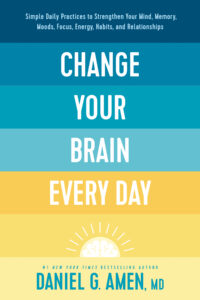
Change Your Brain
Make Rules for Vulnerable Times
Everyone falls; failure only happens when you stop getting up. Many of my patients find it helpful to create simple rules for vulnerable times, such as:
1. Start your meal with healthy foods such as vegetables so there is less room for unhealthy ones.
2. Split entrees.
3. Don’t go to a game or concert hungry; it leaves you vulnerable to the temptation of bad foods, such as cotton candy and hot dogs. Eat ahead of time.
4. Swap dinner plates for salad plates so it forces you to have smaller portions.
5. If you want to “cheat” on your nutrition, call a friend first. This will distract you, delay the craving, and enlist some support.
6. Have a plan when you experience cravings or feel out of control: take a walk, drink a glass of water (you may be thirsty, but misperceive it as hunger), play Tetris for a few minutes (it actually decreases cravings) until the impulse goes away.101
If you are truly going to change, you must change what brings you pleasure. Find what you love about nutritious food. Learn to find what you love about exercise. One of my friends hates running but loves playing table tennis. Connect to who you are becoming; think like a healthy person. How would a healthy person order this meal? The simple act of identifying yourself as a “Brain Warrior,” someone who is a healthy role model for others, can be enough to change the way you see yourself and the way you behave.
Today’s practice: Which of these rules can you adopt for vulnerable times? Write it out and post it where you can see it.
101. Jessica Skorka-Brown et al., “Playing Tetris Decreases Drug and Other Cravings in Real World Settings,” Addictive Behaviors 51 (December 2015): 165–70, https://pubmed.ncbi.nlm.nih.gov/26275843/.
Excerpted from Change Your Brain Every Day: Simple Daily Practices to Strengthen Your Mind, Memory, Moods, Focus, Energy, Habits, and Relationships by Daniel G. Amen, MD. Copyright ©2023.
Used by permission of Tyndale House Publishers, a Division of Tyndale House Ministries. All rights reserved.
________________
Three Steps to Thrive in a Crisis
Develop a TLC mindset. How can you be happy while the world is falling apart? The people who are resilient versus those who are not have a TLC mindset. They see what is happening as temporary, local, and with some sense of control. People who crumble in hard times tend to see the situation as permanent (things will never change) and global (it’s everywhere), and they feel as though they have no control over the situation (they feel like a victim). Here’s how I used TLC to deal with the COVID-19 pandemic.
Temporary: The coronavirus pandemic will not last forever. Think about all the pandemics from the past—the Spanish influenza, bubonic plague, and cholera, for example. They all eventually resolved. This, too, will pass.
Local: Although COVID-19 was worldwide, it did not hit every street in every city in the world. While far too many died, the vast majority of those who contracted the virus survived. Even though my dad died not long after contracting the virus, my mom and others close to me survived it.
Control: What can I “control” during hard times and what can’t I control? During the pandemic, I practiced good hygiene, wore a mask where appropriate, and shored up my immune system with vitamins D, C, zinc, and mushroom extracts. I also took one of the available vaccines, because my experience with my patients was that those who were vaccinated fared better than those who were not.
For managing the control aspect of TLC, I often say the Serenity Prayer. It is the essence of mental health: God, grant me the serenity to accept the things I cannot change, the courage to change the things I can, and wisdom to know the difference. This is the happy person’s way of life. Practicing TLC will strengthen your resilience to get through any significant issue in your life.
Today’s practice: Say the serenity prayer three times today.
Excerpted from Change Your Brain Every Day: Simple Daily Practices to Strengthen Your Mind, Memory, Moods, Focus, Energy, Habits, and Relationships by Daniel G. Amen, MD. Copyright ©2023.
Used by permission of Tyndale House Publishers, a Division of Tyndale House Ministries. All rights reserved.
________________
Tiny Habits for Trauma and Grief
Pick habits that help you feel better fast and last. Each of these habits takes just a few minutes. They are anchored to something you do, think, or feel so that they are more likely to become automatic.
1. Whenever I feel upset, I will cross my arms and stroke down from my shoulders to my lower forearms (this stimulates both sides of my brain and helps to have a calming effect on my mind) for one minute.
2. When I feel a wave of a traumatic memory or grief coming on, I will observe myself, write down any negative thoughts that come to my mind, and challenge them.
3. When painful memories from the past get stuck in my brain, I will write them out from an adult perspective, which can stop the thoughts from circling in my head.
4. When I feel anxious, I will take five diaphragmatic breaths to calm myself.
5. When memories of a traumatic event surface, I will ask myself what I am thinking or feeling. Then in my mind, I will go back to the very first time in my life that I can remember thinking those thoughts or feeling those feelings to see if my past is infecting the present. If it is, I will say to myself, “That was then, and this is now.”
6. When a lost loved one’s birthday (or other anniversary) arrives, I will spend time recalling happy memories and be grateful for the time we had together.
7. When I feel upset or lonely, I will call a friend and ask for their support.
 Today’s practice: Pick one or more tiny habits to place in your life when facing grief or trauma.
Today’s practice: Pick one or more tiny habits to place in your life when facing grief or trauma.
Excerpted from Change Your Brain Every Day: Simple Daily Practices to Strengthen Your Mind, Memory, Moods, Focus, Energy, Habits, and Relationships by Daniel G. Amen, MD. Copyright ©2023.
Used by permission of Tyndale House Publishers, a Division of Tyndale House Ministries. All rights reserved.

















